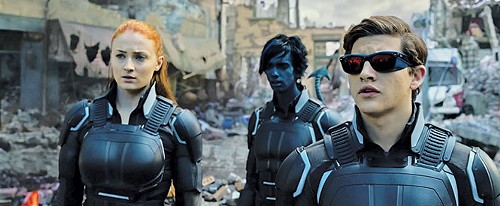The Rule of Threes
X-Men: Apocalypse doesn't even try to be anything but more of the same.
By Scott Renshaw @scottrenshawThere's a snarky in-joke in X-Men: Apocalypse that ends up backfiring about as spectacularly as a snarky in-joke can. Taking advantage of the story's 1983 time-frame, director Bryan Singer and screenwriter Simon Kinberg have a group of the mutant superheroes exit a theater showing Return of the Jedi, where Jean Grey (Sophie Turner) notes that "the third one's always the worst." It's likely a dig at the generally reviled X-Men: The Last Stand as the wrap-up of the Singer-launched original X-Men trilogy, and maybe even a little knowing self-deprecation as this current incarnation of the comic-book team hits its own third go-round. Yet it comes in a movie with no apparent idea of how not to perpetuate that truism.
It's hard to remember that 2000's X-Men was in its way a pioneering movie, pre-dating Sam Raimi's Spider-Man series, Christopher Nolan's Batman trilogy and the now-ubiquitous Marvel Cinematic Universe in establishing that there was an audience hungry for comic-book adventures brought to life. But franchises inevitably face the dangerous question of, "Why should this story continue, other than because we would leave money on the table by not continuing?" All too often, the response is that it can be made bigger. It can be made faster. It can be made just-plain-more.
X-Men: Apocalypse's version of bigger-faster-more means that our mutant protagonists will need to save humanity from a villain who wants to destroy everything. You know, just everything—but especially bridges and recognizable world landmarks. That villain is En Sabah Nur (Oscar Isaac), an ancient Egyptian quasi-god who awakens from a centuries-long slumber ready to eradicate pitiful, primitive humanity from the planet. He's got his traditional "four horsemen" as personal bodyguards and pavers of the way for apocalypse: Angel (Ben Hardy), Psylocke (Olivia Munn), Storm (Alexandra Shipp) and even good old Magneto (Michael Fassbender), whose latest personal tragedy has refreshed his rage. Standing against them are Professor Xavier (James McAvoy), Mystique (Jennifer Lawrence), Beast (Nicholas Hoult) and newer recruits including the aforementioned Jean Grey, Quicksilver (Evan Peters), Cyclops (Tye Sheridan) and Nightcrawler (Kodi Smit-McPhee). And let the melee begin.
Epic hero brawls have already been fairly ubiquitous in 2016 thanks to Batman v. Superman: Dawn of Justice and Captain America: Civil War, which achieved varying degrees of success at the cinematic equivalent of kids picking up their favorite action figures and smacking them into one another while going "PCHOW PEW-PEW-PEW." X-Men: Apocalypse delivers its own slew of three-point-stance hero poses and "who would win a fight between ..." moments, as Singer slings his characters around the CGI battlefields with the practiced ease of someone who knows which one-liners and set-pieces will play well to his audience.
There is, however, almost nothing new to see here, and almost not even the pretense that there's anything new to see here. Once again, as has been the case for more than a decade in this series, the central conflict is really between the world-views of Xavier and Magneto regarding mutants interacting with the human world; their relationship has become an infinitely reset-able cycle of "hello, old friend"/attempts to murder one another/"goodbye, old friend." Lawrence's Mystique continues to serve as the living rope for their philosophical tug-of-war, with Kinberg seemingly clueless as to how to exploit her potentially fascinating ambivalence over her actions in X-Men: Days of Future Past. Singer even recycles the most memorable single sequence in DoFP, giving Quicksilver another slow-mo showcase for his super-speed set to a pop radio staple. This barely feels like a new movie. You'll flip past it on cable a few years from now, and have no clue which one it is.
By the time X-Men: Apocalypse trots out a big cameo appearance of a familiar character—already spoiled in the marketing campaign—it has become sort of painfully obvious that this franchise is running on fumes. Its allegory for civil-rights battles by a feared minority has become just a talking point, and remains the only idea these movies are interested in exploring. We get the point that "the third one's always the worst" largely because everyone involved is simply going through the motions, operating under the impression that it's fine if you have nothing different to say, provided you're willing to say the same thing even louder this time.
More by Scott Renshaw
-
Film Reviews: New Releases for April 12
Civil War, Escape from Germany, Coup de Chance, Hundreds of Beavers, La Chimera, Sting
- Apr 11, 2024
-
University of Utah School of Music premiere of A.L.I.C.E.
Composer connects the Lewis Carroll story to her experience living with autism
- Apr 10, 2024
-
Beavers and Spiders and Thieves, Oh My
Three new films cover a wide range of styles.
- Apr 10, 2024
- More »
Latest in Film Reviews
Readers also liked…
-
Power Plays
Two satirical comedies explore manipulations and self-delusions by those with power.
- Aug 31, 2022




